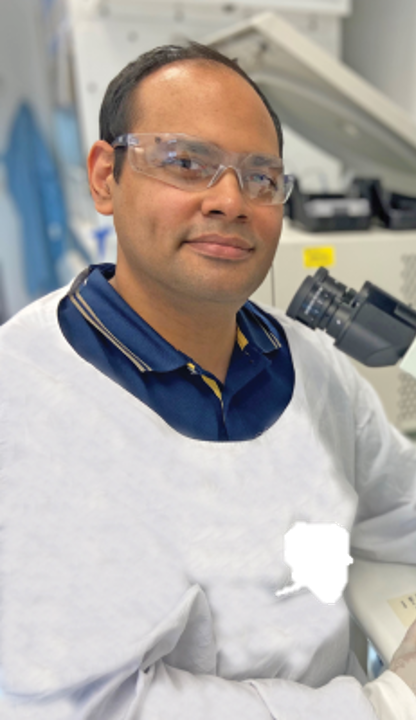UQCCR Brain, Neurology and Mental Health Showcase
This showcase will highlight the research of our early and mid-career researchers and our current students, and will demonstrate the strength of collaborations within our research.
Sessions
- Modelling brain disease
- Biomarkers and imaging brain models
- Brain and mental health
- Clinical applications
Presentations
Ataxia-telangiectasia: Treating mitochondrial dysfunction with a novel form of anaplerosis
 Dr Sara Jose
Dr Sara Jose
Dr Sara Jose recently completed her PhD in neuroscience at the UQ Centre for Clinical Research. Currently, she is working as a post-doctoral research fellow with Emeritus Professor Martin Lavin. Her current research monitors the effect of treatment in Ataxia telangiectasia (AT) patients as part of the clinical trial funded by the NHMRC Medical Research Future Fund (MRFF). Her research also focusses in identifying potential novel biomarkers in AT.
Ataxia telangiectasia is a rare inherited disorder characterized by progressive cerebellar ataxia, oculocutaneous telangiectasia, immunodeficiency, progressive respiratory failure and a predisposition to cancer. It is caused by mutations in the ATM gene which is involved in DNA damage response and repair. Currently, the Lavin lab is involved in a phase II clinical trial that aims to investigate the benefits of an anaplerotic approach to improve the mitochondrial functioning to boost cellular process in AT patients.
Under the scope: neuropathology in newborn brain injury
 Dr Kirat Chand
Dr Kirat Chand
Dr Kirat Chand is a postdoctoral researcher in the Perinatal Research Centre, based at UQCCR. His field of expertise include the establishment of synaptic connections and cellular changes associated with injury in the neonatal brain. His current work investigates the evolution of brain injury in fetal growth restricted (FGR) newborns with a particular interest in understanding mechanisms to develop better detection and treatment strategies for this vulnerable population.
FGR is the second leading cause of perinatal morbidity and mortality, with around 32 million babies born FGR globally each year. FGR is commonly caused by placental insufficiency, resulting in an inadequate supply of oxygen and nutrients to the fetus. The brain is particularly vulnerable to FGR conditions and adverse outcomes in these children range from mild learning difficulties to neurobehavioral issues, and in some cases cerebral palsy. Currently there are no interventions available to protect the FGR brain. Using the pre-clinical pig model, we can examine pathology of the newborn brain. We have identified neuroinflammation as playing a critical role in exacerbating brain injury in FGR newborns and may serve as a therapeutic target.
Combining neuroimaging and immunohistochemistry approaches in brain health, ageing and disease
 Dr Omkar Patkar
Dr Omkar Patkar
Dr Omkar Patkar has been with Mater research/UQ since 2017 and was recently appointed as a postdoctoral researcher with the Perinatal Research Group/Mater research at UQCCR in 2023. Omkar has expertise in brain health and disease specialising in addiction and behavioural neurobiology and developmental neurobiology. He is currently investigating the role of antenatal sulphate supplementation in preterm piglets as a model to understand neurocognitive development in human preterm babies. Omkar’s work has been published in many reputed journals and has attracted media interest which highlights the role of state-of-art brain imaging modalities and molecular techniques to demonstrate brain health in adolescence, disease and ageing.
Proteomics investigating blood biomarkers in fetal growth restriction and associations with neuropathology
 Hannah Musco
Hannah Musco
Hannah Musco is a 2nd year PhD student at the UQCCR Perinatal Research Centre under the supervision of Dr Julie Wixey. After completing her Bachelor of Laws (Hons)/Bachelor of Science in 2020 at UQ, Hannah went on to pursue her interest in neuroscience through completing Honours at the Mater Research Institute – UQ with the Cognitive Health Genomics Group. Her current research project uses proteomics in a preclinical animal model to investigate potential blood biomarkers for identifying risk of adverse neurodevelopmental outcomes in infants with fetal growth restriction. Identifying infants at increased risk of these adverse outcomes would enable earlier supports and interventions to be implemented, thereby improving long-term outcomes.
Neuropathology and cellular distribution in grey and white matter of P10 piglets
 Bhuvaneshwari Harishhankar
Bhuvaneshwari Harishhankar
Bhuvaneshwari Harishhankar is a first-year PhD student at the Perinatal Research Centre, UQCCR. Her research focuses on long-term neuroprotection for growth-restricted infants. Fetal growth restriction (FGR) is one of the leading causes of perinatal morbidity and mortality affecting 32 million infants worldwide annually. The FGR brain is vulnerable to FGR conditions leading to adverse neurodevelopmental outcomes, including cerebral palsy. Currently, no treatments are available to protect the FGR brain. Using a preclinical piglet model of FGR, she is investigating whether ibuprofen treatment at birth improves brain outcomes.
Effects of fetal growth restriction on inflammation and serotonin in the brainstem
 Kelli Brandis
Kelli Brandis
Kelli Brandis is a current honours student in the Perinatal Research Centre with a focus on Fetal growth restriction (FGR). FGR occurs when a fetus fails to meet its anticipated biological potential in utero. An FGR fetus undergoes a hemodynamic redistribution to prioritise cerebral development but renders the brain in a state of chronic inflammation and susceptible to neuronal injury. Serotonin is a crucial neurotransmitter during neurodevelopment and perturbations to physiological levels during critical periods may negatively impact the neonate. Changes in serotonin neuron-glial interactions and axonal damage induced by inflammation could contribute to the neuropathology observed in FGR neonates and subsequent adverse neurodevelopmental outcomes. A comprehensive examination of the serotonergic system and the impacts of inflammation on the FGR brain will inform treatments to protect the vulnerable FGR newborn from adverse neurodevelopmental outcomes.
Blood biomarkers of brain injury in fetal growth restricted piglets
 Glory Eh
Glory Eh
Glory Eh is currently completing her Bachelor of Biomedical Science Honours with the Perinatal Research Centre group located at UQCCR. Her research is focused on investigating potential blood biomarkers for early detection of brain injury in fetal growth restriction (FGR). A significant proportion of newborns with FGR are at risk of developing brain injury and/or adverse neurodevelopmental outcomes. Current methods aimed to detect and diagnose brain injury in FGR infants lack specificity and sensitivity. The use of blood biomarkers for early detection of brain injury will allow earlier interventions to be made and improve neurodevelopmental outcomes for these FGR infants.
Capillary ultrastructure in the cerebral motor cortex - a potential mechanism for plasma loss in the circulation in preterm piglets?
 Victoria Hinkley
Victoria Hinkley
Victoria Hinkley is a PhD candidate at the University of Queensland, Centre for Clinical Research (UQCCR), with a research focus on understanding mechanisms for plasma loss from the circulation in preterm piglets. Victoria’s research interest in vascular biology extends to determining the mechanisms that regulate cerebrovascular tone and blood flow following ischemic stroke, and secondary brain injury after cardiac arrest. This research aims to identify potential specific targets to facilitate controlled blood flow after ischemic stroke and cardiac arrest.
Sulfation pathways in human neurodevelopment
 Prasidhee Vijayakumar
Prasidhee Vijayakumar
Prasidhee Vijayakumar is a second year PhD student with Mater Research Institute and UQ Centre for Clinical Research, The University of Queensland. Her current study involves understanding molecular mechanisms underlying sulfation pathways following preterm birth. Sulfate is an obligate nutrient required for healthy fetal growth and development. Babies born extremely preterm are at risk of adverse neurodevelopmental outcomes and become rapidly sulfate deficient as they lack enzymes to generate sulfate. This study aims to unravel the genetics of sulfate biology in the brain during development and perturbed in preterm physiology.
Hybrid effectiveness-implementation dementia care trials (Tech-CBT and PDCogniCare projects)
 Dr Deborah Brooks
Dr Deborah Brooks
Dr Deborah Brooks is a Research Fellow and Early Career Researcher at the Dementia & Neuro Mental Health Research Unit, University of Queensland Centre for Clinical Research. Her mixed methods research aims to improve the mental health and well-being of Australians living with age-related progressive brain diseases such as dementia and Parkinson’s disease. She is the Project and Implementation Workstream lead for two MRFF funded hybrid effectiveness-implementation dementia care trials; Tech-CBT (2021-25) and PDCogniCare (2023-27). She is interested in the application of implementation science to i) identify barriers and enablers to the implementation of evidence-based interventions and programs, and ii) design and evaluate implementation strategies within health and residential aged care services.
Development of best practice guidelines for neuropsychological assessment for Parkinson’s Disease
Dr Daniel Bailey
Dr Daniel Bailey is a Research Fellow working at UQ’s Centre for Heath Research Service and Centre for Clinical Research. He has a background in gerontology and neurodegenerative diseases. One of Dr Bailey’s current projects is developing Best Practice Guidelines for Neuropsychological Assessment for People Living with Parkinsons Disease, as part of PD-Cognicare project. Dr Bailey is coordinating the input from lived experience experts (People living with Parkinson’s disease and their care partners) into these guidelines. His presentation will outline this project and how lived experience experts views are incorporated into this body of work.
Improving anxiety management in people with cognitive impairment: A mixed-methods evaluation of a therapist training package
 Adam Rouessart
Adam Rouessart
Adam Rouessart is a BSc (Honours in Psychology) student at The University of Queensland completing his honours thesis at UQCCR within the Dementia and Neuro Mental Health Research Unit under the supervision of A/Prof Nadeeka Dissanayaka. Prior to commencing my studies at UQ, I served in the Royal Australian Air Force as a fighter pilot and test pilot before deciding to pursue research and career opportunities within the academic fields of psychology and neuroscience. I am deeply passionate about understanding biological and genetic factors associated with psychiatric disorders and neurodegenerative diseases. I am also committed to translating research findings into meaningful outcomes to enhance the lives of people affected by these conditions.
Barriers and facilitators to delivery and engagement with CBT interventions for MCI/Dementia: A systematic review of technology assisted and non-technology assisted approaches
 Kimberley Welsh
Kimberley Welsh
Kimberley Welsh is undertaking her PhD in UQCCR’s Dementia & Neuro Mental Health (DNMH) Research Unit under the supervision of Associate Professor Nadeeka Dissanayaka.
Her PhD is focused on the implementation of technology-assisted psychotherapy interventions and this includes a process evaluation of a DNMH project called Tech-CBT. This project is aimed at reducing anxiety symptoms for people living with dementia and mild cognitive impairment and the development of implementation guidelines for future interventions. Her focus is to reduce the ‘implementation gap’, reducing the time it takes for the public to access and use new research and new technologies in the real world. She is hoping that her PhD will inform herself and others on how to implement interventions, particularly technology-assisted interventions, in more efficient and effective ways.
Unpacking Parkinson’s disease aMCI: Memory and the Hippocampus
Alexandra Hawes
Alex is a current psychology honours student completing her thesis in the Dementia and Neuro Mental Health Unit at the UQCCR, under the supervision of A/Prof Nadeeka Dissanayaka. Parkinson’s disease (PD) is the second most common neurodegenerative disease of ageing. Although PD is characterised by motor function disturbances, it is less well known that PD is associated with a range of non-motor symptoms, including anxiety, depression, cognitive impairment, sleep disorder and dementia. Dementia prevalence in PD is particularly high; 80% of PD patients have a dementia diagnosis in late stages of the disease. Alex’s honours thesis aims to explore the hippocampus as a biomarker for Parkinson’s disease amnestic mild cognitive impairment, which can be understood as a pre-dementia stage in PD. Exploring the hippocampus as a biomarker for PD amnestic mild cognitive impairment may drive the development of novel therapies that reduce dementia risk in PD and initiate earlier action in disease management and care planning, thus alleviating the burden on patients, families and public health systems.
Advancing neurodegeneration research through brain organoids
 Dr Romal Stewart
Dr Romal Stewart
Dr. Romal Stewart, an early career Research Scientist, completed his postdoctoral studies at the University of Queensland in 2019. In 2023, he joined the Neuroimmunology laboratory at UQCCR. His primary research focuses on developing pre-clinical model systems to elucidate the cellular and molecular mechanisms underlying neurodegenerative diseases, including Alzheimer's Disease, Motor Neuron Disease, Multiple Sclerosis, and neuro-COVID.
Neurodegenerative diseases pose a significant worldwide health challenge, contributing markedly to global mortality. Despite their widespread occurrence, a significant fraction lacks effective treatment, a situation rooted in our limited understanding of their pathophysiology. Brain organoids offer a novel and promising method for studying neurodegenerative diseases. Dr. Stewart's presentation will explore the significant potential of brain organoids as a research instrument, particularly emphasising their ability to model the abnormalities seen in Alzheimer’s disease (AD).
Using iPSC-derived brain cells and brain organoids to explore the effects of aberrant NF-κB signalling in brain cells in multiple sclerosis
 Kaijie Tang
Kaijie Tang
Kaijie Tang is a second-year PhD student at The University of Queensland, Centre for Clinical Research. He holds a dual Bachelor's degree in Medicine and Economics. His current research focuses on Multiple Sclerosis, aiming to uncover the underlying pathogenesis of the disease and identify potential therapeutic targets. Their work employs induced pluripotent stem cell (iPSC)-derived brain organoids as the research model.
The role of Epstein-Barr virus in multiple sclerosis
 Peter Csurhes
Peter Csurhes
Peter is a research immunologist with more than 30 years of research expertise in studies of multiple sclerosis (MS), 18 years of which have been specifically investigating the role of Epstein-Barr virus (EBV) in MS within The University of Queensland. He has also worked within the QIMR-Berghofer research institute (5 years) on areas including malaria vaccine research and EBV-related oncology studies.
His extensive expertise in immunology-oriented research includes use of complex polychromatic flow cytometry methodologies to quantitate and characterise anti-viral immunity. He has an intimate knowledge of the intersection between the biology of EBV and MS.
Peter recently received successful MRFF funding to continue research efforts into understanding the role of EBV in the underlying disease processes in MS, has recently commenced PhD studies, and is committed to making a difference to the lives of people living with MS and other autoimmune diseases.
Investigating how infection with EBV relates to development of Multiple Sclerosis using a humanized mouse model
 Sini Mollick
Sini Mollick
Sini is currently a PhD student at the University of Queensland Centre for Clinical Research (UQCCR) in the Neuroimmunology group. Recent studies suggest that Epstein Barr virus (EBV) might be a necessary component in the pathogenesis of multiple sclerosis (MS). Proving this in humans is challenging due to the high incidence of EBV infection and the relatively infrequent development of MS, which would require extensive longitudinal studies. The lab has developed a novel mouse model. Sini will use this model to explore how the timing of EBV infection affects MS development.
The use of the e-Nose as a biomarker in ALS
 Dr Robert Nona
Dr Robert Nona
Rob is a UQCCR PhD candidate in Amyotrophic Lateral Sclerosis (aka Motor Neurone Disease). After 15 years of clinical practice, he switched to a research mindset and completed his MPhil “Studies of Amyotrophic Lateral Sclerosis” in 2022, under supervision of Prof Pam McCombe and A/Prof Rob Henderson, supported by the RBWH MND Clinic and UQCCR MND Research Group.
His PhD “Survival and heterogeneity of ALS” includes several projects analysing biomarkers, and he already has several publications in this field. The primary PhD project is investigating the electronic nose (e-Nose) as a biomarker in MND, for which he was recently able to present preliminary data at the MND ANZ Symposium.
The worm has turned
 Dr Aakanksha Dixit
Dr Aakanksha Dixit
Aakanksha Dixit is an Early Career Researcher in the Neuroimmunology group at UQCCR. Her research focuses on Multiple Sclerosis and specialises in using pre-clinical models of Multiple Sclerosis to enhance the translation of new therapeutic approaches to the clinic.
Multiple Sclerosis is a chronic inflammatory and demyelinating disease of the central nervous system and is the most common non-traumatic cause of acquired chronic neurological disability in young adults in Australia, with a cost to the Australian economy of >$ 2 billion per year. The cause of MS remains elusive, and there is no cure. Helminths can exert protective effects on autoimmune diseases. Deliberate infection with helminths is therefore being explored as a potential therapeutic strategy for autoimmunity. We have been investigating excretory-secretory products from the liver fluke Fasciola hepatica and the mechanism(s) by which it induces protection prophylactically and therapeutically.
